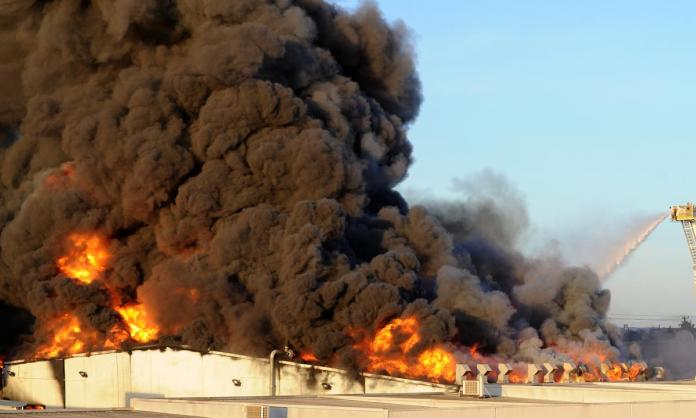Just as the last federal election campaign was getting started, a massive explosion ripped through a toxic waste facility in Campbellfield in Melbourne’s northern suburbs. Two workers—both Tamil refugees—were hospitalised. Surrounding suburbs were blanketed with highly toxic smoke.
It was the fourth major fire in a waste facility in Melbourne’s working-class suburbs in just three years. As Victorian Socialists crank up our campaign in 2022, the issue is still a significant talking point in Melbourne’s north.
In late March, I sat in on the legal proceedings relating to the disasters in Victoria’s waste industry. Zooming in to view the committal hearing of Graham White, who is charged with a string of offences related to alleged illegal chemical waste dumps, was an informative experience.
A lot of the chemicals in the illegal dumps allegedly controlled by White are said to have come through Bradbury Industrial Services—the operators of the Campbellfield facility. When one of White’s alleged dumps exploded in Tottenham in Melbourne’s western suburbs in 2018, Bradbury even tendered for the clean-up job.
The company is facing charges in a separate case. In court in March were White, his barrister and the regulators. White was committed to stand trial on all charges and has pleaded not guilty. He’ll face court again on 26 April for a directions hearing.
But missing from the court are the companies that count the most cash with the cleanest hands, the companies that paid Bradbury and White cut-price rates to take chemical waste off their hands in what is alleged to be a criminal enterprise.
New laws now place some responsibility on companies to make sure their waste doesn’t end up in illegal chemical dumps. But I haven’t heard of any attempt to recover the profits from this practice, which was widespread in Victoria from the mid 2010s.
By the nature of the court case, there’s also no spotlight on the regulators themselves. Years of “light touch regulation” and “industry self-regulation” led to a situation in which the regulation of the waste industry was, in practical terms, non-existent. It’s nice that, years after the event, the Environment Protection Authority and WorkSafe are bringing some cases to court. But their own roles remain unexamined—and the special prosecutions unit of the EPA has been disbanded after deep funding cuts.
But the most striking absence from the court were the heroes of this story—the workers at Bradbury Industrial Services. They had called the union in, started to fix wage underpayments and were establishing a network of health and safety representatives to keep themselves and local residents and workers safe. Almost all of them were Tamil refugees on temporary visas. Despite great difficulties, they nevertheless fought for themselves and the wider community by taking on the bosses at Bradbury.
Red Flag interviewed the employees for an extraordinary 2019 article, “Workers speak out after factory fire in Melbourne’s north”. They talked about how WorkSafe would give advance notice of visits, so the boss would give out respirators to the workers in the morning—and then take this vital safety equipment back as soon as the inspectors left. They talked about their efforts to organise.
The organising efforts continue in the waste industry and beyond. At a gathering in a comrade’s backyard in late March, I bumped into one of these heroes. He’s in a different industry now, but still facing the same fights—on safety, wages and job security—and looking for the opportunities to organise.
In the aftermath of the Bradbury explosion, Victorian Socialists called a small protest outside Hume Council. We demanded that the council use its resources to call a community rally, start an audit of industrial facilities in Campbellfield and support our call for a health study of every resident and worker affected by the smoke.
This last demand was based on the health study won by residents of the Latrobe Valley following the catastrophic Hazelwood coal mine fire in 2014. That study found a long-term reduction in lung capacity among those exposed to the smoke, equivalent to between four and ten years of ageing. There were effects on newborns whose mothers were exposed to the smoke. Of course, it’s another matter to campaign for and win the health services to address these problems, but the first step is to look into the health effects of the repeated fires—and in the working-class suburbs of Melbourne, no-one was even looking.
We didn’t win our demands from the protest. But we at least gave a voice to local residents and unionists, and normalised the idea of calling protests about the issue. When the Anti Toxic Waste Alliance protested outside a dodgy glass recycling facility in Coolaroo a few months later, the EPA finally did what it had refused to do at Bradbury—use its “step in” powers to take control of the site and remove the toxic hazard.
Despite our tiny forces, we were able to provide an example of a socialist approach to politics.
It’s kicking up a fuss, not just politely going through the proper channels. It’s pointing out that while the profits from the whole disastrous setup are counted in Collins Street, Toorak and Brighton, the toxic costs are experienced in Campbellfield, Coolaroo, Dallas and Broadmeadows. It’s supporting workers organising, because organised workers are the hope of the world—and were the only source of hope at Bradbury.
Building this sort of force in Australian political life is worth a lot. The Bradbury explosion and fire is a reminder, if you need one, that we’ve got a world to win.
Jerome Small is the Victorian Socialists federal election candidate for Calwell in Melbourne's northern suburbs.









